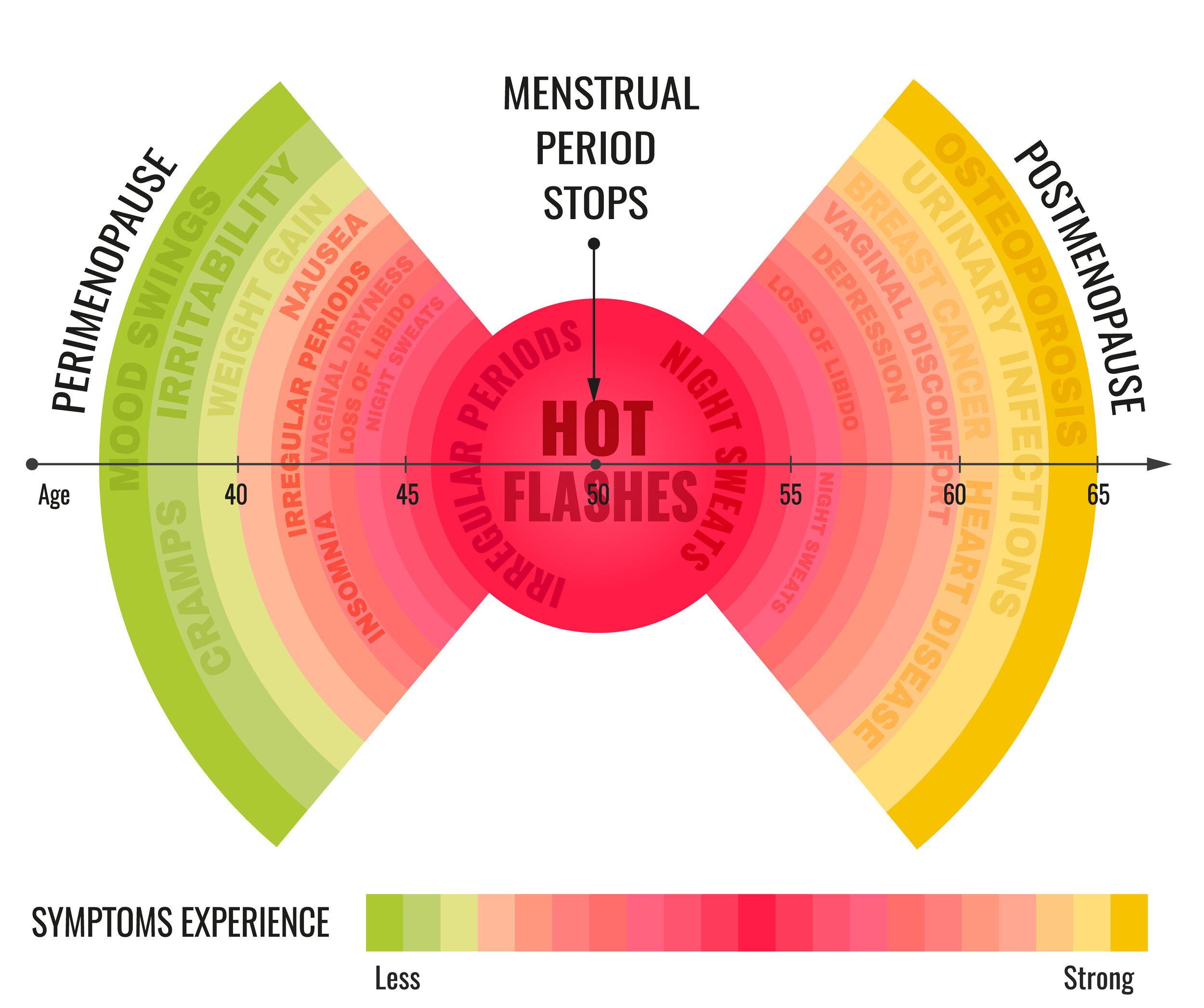Understanding Menopause, Part 2
Menopause is a phase of life that every middle-aged woman will go through. That’s why it is important to understand what happens during this transition and how you can have a positive experience through menopause.
Natural menopause is defined by 12 consecutive months without a menstrual cycle. Menopause typically occurs between the ages of 40 and 58, with the average age of 50-52. Perimenopause – the period of time leading up to menopause – begins when your menstrual cycle becomes irregular and can last anywhere from 4-10 years. This transition marks a shift in hormones, specifically the sex hormones estrogen, progesterone and testosterone.
These and all other hormones are produced by endocrine glands such as your ovaries, adrenals, thyroid, parathyroid, hypothalamus, pituitary, pineal and pancreas. They are your body’s messengers and help regulate reproduction, growth and development, metabolism and energy, nutrient and electrolyte balance in the blood, water balance in the body, and your stress response. All hormones work in concert with each other to maintain balance in the body, so the hormonal shift during menopause can also affect other hormones.
Estrogen and Progesterone
During perimenopause estrogen levels vary widely, spiking and dipping at irregular times. This can aggravate PMS and other conditions such as endometriosis and uterine fibroids. As your body reaches menopause your ovaries stop producing estrogen and estrogen production is then solely relegated to your adrenal glands. Progesterone follows a similar path as estrogen – fluctuating during perimenopause and declining as your adrenal glands become the only source of production. This is a natural process and a healthy body can adjust in post-menopause. However, a healthy transition into and out of menopause is dependent on the health of all the other endocrine glands. So if there is dysfunction in any endocrine gland, hormones become imbalanced. This leads to more prominent symptoms, as well as increased risk for several diseases. Two particular glands – adrenals and thyroid – are key to optimal health during peri- and post-menopause.
Adrenal and Thyroid Health
The state of your adrenal glands and thyroid can have an effect on your transition into menopause. Before menopause, the adrenal glands are a secondary source of sex hormone production – estrogen, progesterone and testosterone. After menopause they become the primary source of sex hormones. Problems arise when the body is under chronic stress. The adrenals require progesterone to produce cortisol – the ‘stress’ hormone. So high cortisol levels deplete progesterone. This leaves estrogen levels unchecked and creates a state of estrogen dominance.
Estrogen dominance can then effect the thyroid. Imbalanced estrogen levels can decrease conversion of the inactive thyroid hormone T4 to its active form T3. Additionally, another stress hormone – adrenaline – causes estrogens to metabolize into another form that increases adrenaline levels even more. High adrenaline will actually slow down the thyroid, adding to the problem. This imbalance of adrenaline, cortisol and estrogen can increase severity of menopausal symptoms such as hot flashes, sleep disturbances, mood swings, headaches, anxiety or depression, fatigue, weight gain, loss of libido and memory problems. So stress management can be your best defense before and after menopause.
Understanding some of the body systems affected during menopause – specifically brain, memory, mood, sleep, skin, heart and pelvic health – can help you enter this new phase of womanhood with only mild symptoms.
Your Brain on Menopause
During your reproductive years, estrogen, progesterone and testosterone levels remain relatively predictable. However, as you transition into menopause the levels of sex hormones rapidly decline. Estrogen stimulates the brain and may improve learning and memory, while progesterone calms the brain and decreases anxiety. So a rapid decline in these hormones can lead to cognitive changes including short-term memory loss, difficulty concentrating, lack of mental clarity, impaired learning capacity, anxiety, depression and mood swings. These symptoms can then negatively affect your emotions and physical health. Additionally, decreasing estrogen levels reduces acetylcholine production – a key factor in nerve cell branching. Early menopause can increase your risk of dementia. So mental and cognitive health are very important during your transition into menopause.
Sleep During Menopause
The stress of new symptoms alone can interrupt sleep. Furthermore, progesterone helps induce sleep so a dip in progesterone can also affect sleep. Add in a very common symptom – hot flashes – and it can severely affect your sleep and quality of life. If you suffer from insomnia, creating a calming bedtime ritual and supplementing with melatonin, valerian, magnesium or chamomile can help.
Skin Health and Menopause
Estrogen is very beneficial to your skin. It maintains collagen and skin thickness which creates vibrant, plump, young looking skin. As estrogen levels decline, skin becomes thinner, drier and more wrinkled. Change in the ratio of estrogen to testosterone can also increase adult acne breakouts. To add insult to injury, free radicals create oxidative damage to collagen and elastin which increases wrinkles as well. If you suffer from adult acne or decreased skin integrity, increase your consumption of foods rich in antioxidants and carotenoids – such as vegetables and salmon – and consider vitamins E and C and CoQ10 supplements to protect your skin.
Heart Health and Menopause
Just as estrogen enhances skin health, it also improves heart health. That is because estrogen helps to increase HDL cholesterol and decrease LDL cholesterol. As estrogen levels decline, risk or cardiovascular disease increases. Of course, consuming a diet high in refined carbohydrates, processed foods and sugar will increase inflammation in the body, compounding the effect on heart disease risk. Consuming foods high in antioxidants and omega-3 fatty acids – such as organic produce and cold water fish – and supplementing with CoQ10 can protect skin and heart health.
Nutrition and Lifestyle Choices
The most powerful tool you have is understanding your stressors, both past and present. That’s because awareness of your stressors and changing your perception of them to a more positive, healing one can create a trickle-down effect. Stress management supports your adrenal glands which can better balance hormones through menopause. This then supports your thyroid, brain health, sleep, skin and heart.
Additionally, the following dietary and lifestyle suggestions will support your body during menopause.
Consume a balance of proteins, healthy fats and complex carbohydrates at each meal to balance blood sugar and support the adrenal glands.
Avoid sugar, caffeine, alcohol, and restrictive diets.
Eat foods rich in omega-3 fatty acids for skin, heart and brain health.
Consume foods rich in phytoestrogens such as fermented organic soy, flaxseeds and legumes.
Take a high quality multivitamin.
Consider supplementing with adaptogen herbs such as ashwganda, rhodiola and ginseng.
Consider herbal therapies such as black cohosh for relief of menopause symptoms.
Drink chamomile tea in the evening to promote sleep.
Incorporate exercise into your weekly routine for stress management and improving mood.
Remember that menopause is a natural process of aging. Embrace your new phase of life!
RESOURCES:
Dr. Bob’s Drugless Guide to Balancing Female Hormones, Dr. Bob DeMaria
The Encyclopedia of Natural Medicine, Murray, ND & Pizzorno, ND

